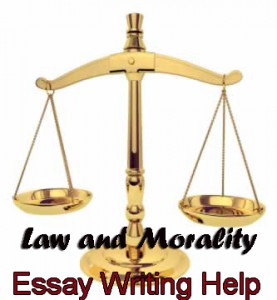
Essay Paper on Law and Morality
This paper is intended to consider on the question of morality and law – whether these two notions are interdependent or have to be separated from each other. It defines both of these notions and considers the situations when law depends on morality and cannot be separated from it. Also, the instance is going to be cited of situations where law does not regulate the relations between people but morality does.
 The issue of law and morality, their interdependence and, at the same time, the necessity to separate them from each other – all these questions accrue from different points of view onto moral and legal regulations – there exist positivists (who believe that law and morality cannot be dependent on each other) and non-positivists (who believe the contrary). It seems to be a lifelong issue of discussion and is often called “an-egg-or-chicken-question”. And this very issue is going to be contemplated in this work.
The issue of law and morality, their interdependence and, at the same time, the necessity to separate them from each other – all these questions accrue from different points of view onto moral and legal regulations – there exist positivists (who believe that law and morality cannot be dependent on each other) and non-positivists (who believe the contrary). It seems to be a lifelong issue of discussion and is often called “an-egg-or-chicken-question”. And this very issue is going to be contemplated in this work.
To begin with, it is first of all important to define law and morality themselves. Abhishek Raj gives definition to these two notions as follows. Law is believed to be a collection of legal rules meant for determine people’s behavior (and they in their turn are estimated by the state). Beside that, the state carries them into effect when someone infringes these rules. Morality on the other hand implies rules of conduct connected with some kind of social and psychological qualities. Observation of these norms will make one feel moral (or virtuous), while their breach will implicate feeling of guilt. Morality and law have different origins: morality is taught and is supposed to be engrained from the very childhood to every person; and law is usually created and enforced. Thus, it is understandable that morality comes from within the human personality, and law comes from the outside to regulate people’s behaviors.
At all accounts law has to be based on the principles of morality. The example is Christian Ten Commandments which are basic to common law as well as to criminal law. The court makes decisions on different cases relying on laws which regulate what can be done and what cannot be committed by the individuals in our society. On the other hand, there also exist such situations when there is no certain legislation to be applied. (The precedent has occurred but there is no law developed for it.) In such situations the court is to rely upon morality. Also, “morality is brought in when judges face the dilemma of deciding a case wherein more than one but contradicting legal remedy is applicable but there is no clarity with regard to their priority”. Moreover, there can be certain regulation available, but if applied this will result in injustice – in this case morality is also deferred to.
It is also significant to specify that morality and law are by no means the same or equal. What is moral can be illegal (for example, cheating on a tax return in order to save money for supporting old parents and one’s own family – it is certainly illegal, but for some it is moral). On the other hand, which is immoral is sometimes legal (like cheating on one’s spouse – no one can be legally punished for that as there is no legislation prohibiting it). If some people believe something is not moral and has to be made illegal they need to find enough supporters to make such law valid. And vice versa, if enough people argue something to be legalized they can in the same way gather and court it…
This is just a free sample of the research paper, or part of the research paper on the given topic you have found at ProfEssays.com. If you feel you need professional writing assistance contact us! We will help you to create perfect research paper on any topic. ProfEssays.com – Leading custom essay and dissertation writing company and we are 24/7 open to serve you writing needs!
Don‘t hesitate! ORDER NOW!
 + 1-888-827-0150
+ 1-888-827-0150 + 44-20-3006-2750
+ 44-20-3006-2750










